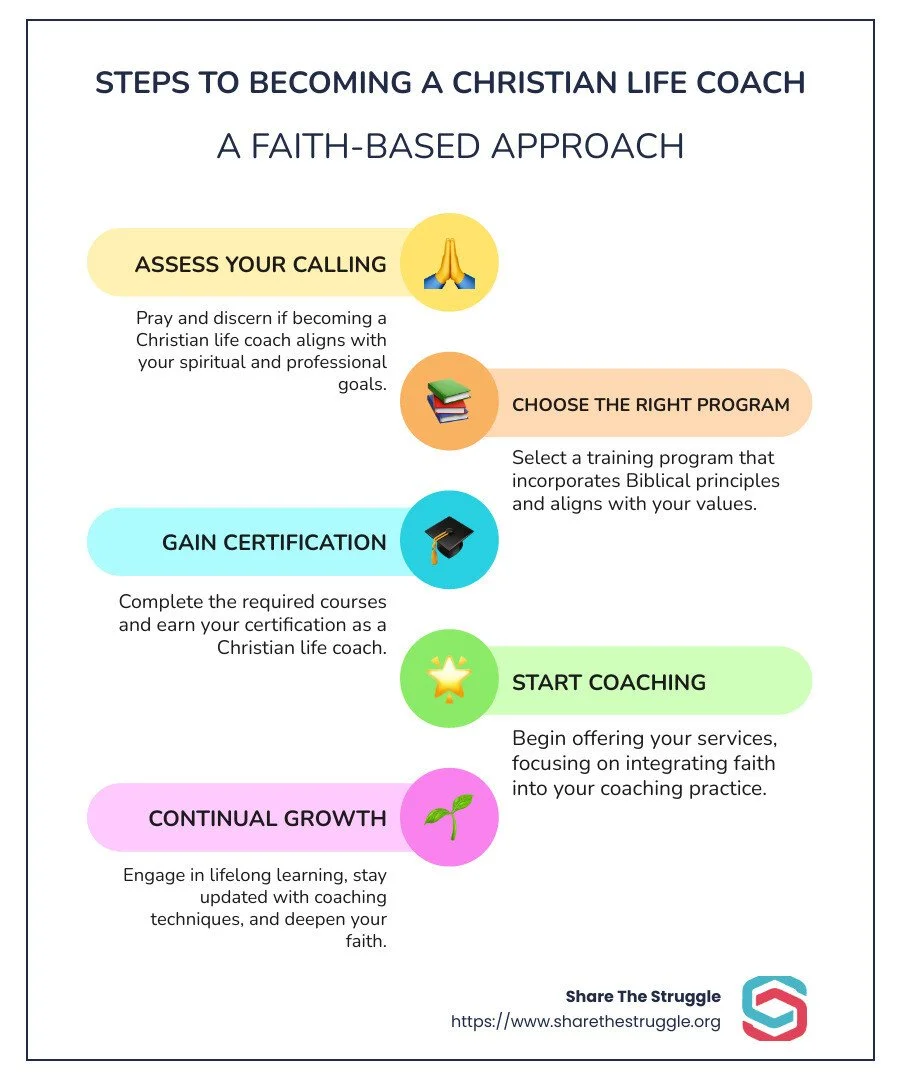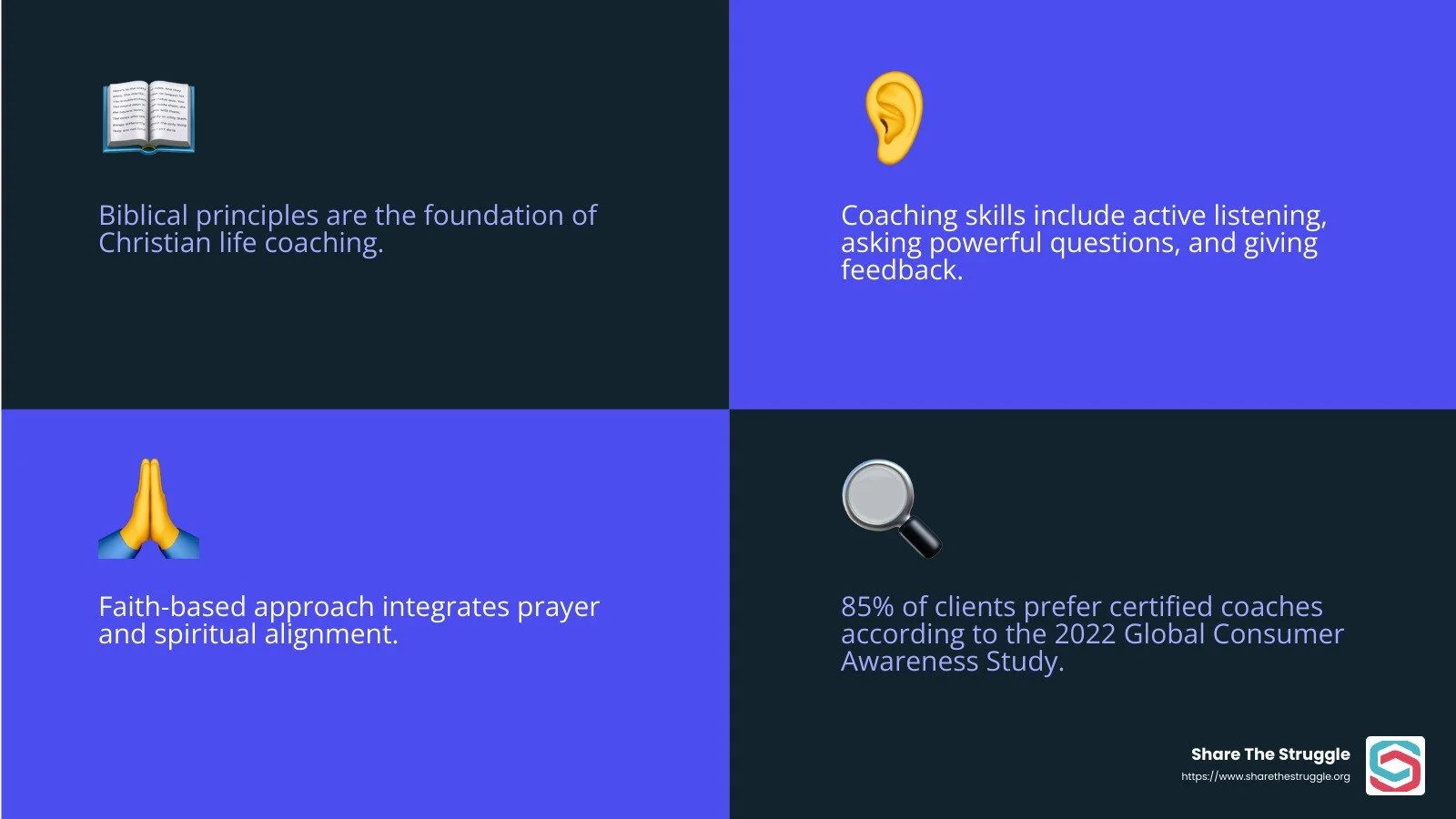Your Guide to Christian Life Coach Training: Online and Offline Options
When considering christian life coach training, it's important to find a program that aligns with your faith and professional aspirations. Whether you're looking to guide others through personal struggles or help them achieve spiritual growth, the right training can make all the difference. Here's why:
Christian life coaches offer faith-based support to help with personal or professional challenges.
Programs often include Biblical principles, coaching skills, and faith-based approaches.
Effective training can address mental and emotional health, aligning with God’s plan for their lives.
Becoming a certified Christian life coach can deeply enrich your coaching journey and open up countless avenues to make meaningful differences in people’s lives.
My name is Richard Mattingley. With over five years of experience in mental health and learning development, I specialize in making complex topics accessible and guiding individuals toward emotional and spiritual well-being. In this guide, I'll walk you through everything you need to know about pursuing christian life coach training.
Christian life coach training is all about equipping individuals to guide others through life’s challenges using a faith-based approach. This kind of training blends Biblical principles with modern coaching techniques to help people find clarity, purpose, and fulfillment aligned with God's plan.
Key Components of Christian Life Coach Training
1. Biblical Principles A Christian life coach uses the Bible as a foundational guide. Verses, stories, and teachings from the Bible are integrated into coaching sessions to inspire and direct clients. For example, coaches might use Scriptures to offer comfort during tough times or to provide wisdom for making decisions.
2. Coaching Skills Effective coaching requires specific skills. These include active listening, asking powerful questions, and providing constructive feedback. Christian life coach training programs focus on these core skills, ensuring that coaches can effectively support their clients.
3. Faith-Based Approach The faith-based approach is what sets Christian life coaching apart. It involves recognizing God's presence in every aspect of life and encouraging clients to seek His guidance. This might include prayer during sessions or helping clients align their goals with their faith.
What Do Christian Life Coaches Do?
Christian life coaches help clients in various areas, such as:
Spiritual well-being: Guiding clients to deepen their relationship with God.
Relationships: Offering support in building and maintaining healthy relationships.
Career growth: Helping clients find and pursue their God-given calling.
Grief and trauma: Providing comfort and direction during difficult times.
Why Pursue Christian Life Coach Training?
Credibility and Trust According to the 2022 Global Consumer Awareness Study, 85% of clients prefer coaches with certification. Earning a certification from a recognized program can boost your credibility and help clients trust your guidance.
Skill Development Training programs offer structured learning, covering essential coaching skills and Biblical knowledge. This ensures you are well-prepared to help clients steer their challenges with faith-based wisdom.
Personal Growth Engaging in Christian life coach training can also be a transformative experience for you. It deepens your faith and equips you with tools to live a more fulfilled and purpose-driven life.
Real-Life Impact
Consider the story of Judy Sprinkle, a certified Christian life coach. After completing her training, she reported feeling more equipped to integrate Biblical truths into her coaching practice. Her clients have found greater peace and clarity by aligning their lives with God’s will.
In summary, Christian life coach training is a powerful way to blend faith and professional skills to support others. Whether you’re looking to start a new career or improve your current one, this training can be a meaningful step forward.
Next, we'll dive into the top programs available to help you become a certified Christian life coach. To get connected with a coach who can guide you through your journey, visit Share The Struggle.
Choosing the right Christian life coach training program can feel overwhelming with so many options available. Here are some key factors to consider to help you make the best decision for your calling.
Program Cost
The cost of certification programs varies widely. Your budget will play a crucial role in your decision. Some programs even offer payment plans to make the cost more manageable.
Pro Tip: Don't just look at the sticker price. Consider what each program includes—like mentorship, live sessions, and additional resources.
Course Length
The duration of the programs can range from a few weeks to several months. Think about how much time you can realistically commit. Self-paced programs give you the flexibility to learn at your own pace.
Quick Fact: Most online programs provide access for up to 365 days, allowing you to study when it suits you best.
Accreditation
Accreditation can lend credibility to your certification. Programs accredited by institutions like the International Coach Federation (ICF) or the Continuing Professional Development (CPD) standards offer additional recognition. While not all programs are accredited, they may still be recognized for continuing education credits with organizations like the APA and NBCC.
Did You Know? According to the 2022 Global Consumer Awareness Study, 85% of clients think it’s important for a coach to hold a certification or credential.
Mode of Delivery
Consider whether you prefer online or in-person learning. Online courses offer flexibility, while in-person sessions provide more immediate interaction. Some programs combine both with hybrid models, including live sessions and role-playing exercises. Programs often emphasize online delivery but include interactive elements like webinars and coaching practicums.
Fun Fact: Many online programs include tools like neuro-linguistic programming (NLP) techniques and coaching templates to improve your learning experience.
By considering these factors—cost, course length, accreditation, and mode of delivery—you can find a Christian life coach training program that aligns perfectly with your goals and lifestyle.
Ready to start your journey? Connect with a coach today and find out how you can make a profound impact through Christian life coaching.
Frequently Asked Questions about Christian Life Coach Training
How to become a Christian-based life coach?
To become a Christian-based life coach, you typically need to complete a certification program. While certification is not mandatory, it lends credibility and equips you with essential skills. Here are some steps to consider:
Choose a Certification Program: Look for programs that align with your values and goals. Share The Struggle offers a comprehensive program that includes essential training and mentorship.
Complete Required Training Hours: Many programs, like those accredited by the ICF, require you to complete at least 125 hours of instruction. This training covers coaching principles, ethical guidelines, and practical skills.
Gain Practical Experience: Most certification programs require you to complete a certain number of practice hours. For example, the PCC (Professional Certified Coach) certification requires 500 hours of coaching practice, which helps you gain real-world experience.
Get Credentialed: After completing your training and practice hours, you can apply for certification through organizations like the ICF or the International Board of Christian Care (IBCC).
Build Your Business: Use your new skills to attract clients. Share The Struggle offers training in business development and marketing strategies to help you launch a successful coaching practice.
Are Christian life coaches in demand?
Yes, Christian life coaches are in high demand. The rise in personal coaching and the increasing need for faith-based guidance have contributed to this trend. According to the 2022 Global Consumer Awareness Study, 85% of clients believe it's important for a coach to hold a certification or credential. Certification programs not only provide essential skills but also give you a competitive edge in the market.
Rising Demand:
Personal Coaching: Many individuals seek personal coaching to align their lives with their faith and values.
Certification Programs: The availability of specialized certification programs has made it easier for aspiring coaches to gain the necessary skills and credentials.
How do I become a spiritual life coach?
Becoming a spiritual life coach involves a few key steps:
Select an Accredited Institute: Choose a program that offers accredited training. Share The Struggle provides niche certifications in areas like crisis pregnancy and mental health, which can be particularly valuable for a spiritual life coach.
Complete Your Training: Ensure you complete the required training hours. Many programs offer flexible, self-paced options. Share The Struggle allows you to complete its certification program in about 30 days.
Build a Business Platform: Learn how to attract clients and build your coaching business. Share The Struggle provides training in personal branding and marketing strategies.
Transparent Communication: Develop skills in transparent communication to effectively guide your clients through their spiritual journeys. This involves asking thought-provoking questions and practicing active listening.
Ongoing Support: Join a community of like-minded coaches for ongoing support and professional development. This can be invaluable as you grow your coaching practice.
By following these steps, you can become a successful spiritual life coach, helping clients find their God-given purpose and live fulfilling lives.
Ready to make an impact through Christian life coaching? Connect with a coach today and start your journey!
Conclusion
At Share The Struggle, we believe in the transformative power of Christian life coaching. Our captive thoughts coaching model, inspired by 2 Corinthians 10:5, encourages you to take control of your thoughts and align them with Christ. This model is designed to help you overcome emotional and mental health struggles, changing negative thought patterns into a mindset of love and forgiveness.
Christian life coach training equips you with the skills to guide others through their faith-based journeys. Whether it's helping clients find their God-given purpose, reduce stress, or improve relationships, the role of a coach is both impactful and fulfilling.
Faith-Based Support: Our approach integrates Christian principles with mental health support, offering a holistic way to heal and grow. By becoming a certified Christian life coach, you can provide this invaluable support to others, helping them steer life's challenges with faith and resilience.
Connect with a Coach: Ready to start your journey in Christian life coaching? Connect with one of our experienced coaches at Share The Struggle and begin making a lasting difference in the lives of others.
Join us in this mission to provide faith-based coaching and make a profound impact through Christian life coaching. Your journey to transform lives starts here.



